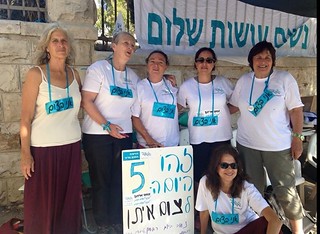Over 300 Jewish and Palestinian women will be fasting together over the next six weeks in a tent outside Prime Minister Binyamin Netanyahu’s residence in Jerusalem. Those fasting are part of Women Wage Peace, which formed during the Gaza war last summer as a collective voice standing against Israel’s brutal assault. Their fast is taking place from July 7 to August 26, marking the 50-day span of last year’s violent conflict, in which over 2,251 Palestinians and 73 Israelis were killed.
The purpose of their fast is twofold: 1) to demand pursuit of a political resolution and peace accord between Israel and Palestine, and 2) to spark conversations about Israel’s failed and painful use of violence to resolve its geopolitical conflicts.

Women chant in front of Netanyahu
The organization sent Netanyahu a letter before setting up their tent last week, part of which made clear one of their intentions is to be visible every time Israel’s leader leaves and returns home:
“In the next few days we will become neighbors. You will see us each and every time you leave your home or return, sitting on the corner, day and night … We call on you to return to negotiations and reach a political solution, in order to prevent the next war.”
 Indeed, they have become impossible to miss, sitting upon mattresses amidst a protest camp, holding placards demanding a return to negotiations, wearing signs indicating they are fasting, screening films, attracting the curious, the resentful.
Indeed, they have become impossible to miss, sitting upon mattresses amidst a protest camp, holding placards demanding a return to negotiations, wearing signs indicating they are fasting, screening films, attracting the curious, the resentful.
All before Netanyahu’s home.
The hundreds of women participating will be fasting in small groups, each for between 20-50 hours at a time, rotating over the 50-day span. Of course, fasting plays a powerful role in both Jewish and Muslim societies. The act alone – along with its symbolic significance, representing mourning and cleansing – would reverberate strongly. However, in the wake of Israel’s release of Palestinian hunger striker, Khader Adnan, the symbolic reverberations have been elevated.
Many moving quotes from those activists currently fasting have been captured by media across the Middle East. However, those quoted by Michael Salisbury-Corech in +972 Magazine, Israel’s online gem, resonate most powerfully with me.
Below are quotes by Yael Trader, an Israeli Jew, and Maysam Jaljuli, a Palestinian citizen and women’s movement leader in Israel:
Yael Trader:”We wanted to do something significant, because since the last war there has been no process toward an agreement. The last war broke me because of the force that was used, as well as how strong the Israeli consensus was. It frightened me because the common conception here is that only force will solve our problems, and it was clear to me that this doesn’t work. I was close to asking myself whether I can continue to live here. The only remedy for my desperation was to get up and do something.”
Maysam Jaljuli:
I was very despondent and felt like there is no chance for peace. I am an activist for equal rights, and during the war I felt like everything we built was destroyed. Every instance of racism, every time an Arab was harassed at the workplace, and of course the attacks and the massacre in Gaza broke me. Sometimes I cannot believe that life continued. And truly at the end of it all, I had to continue and struggle. To believe in hope, especially for our children.
When Women for Peace first organized, it gave me hope, and I immediately agreed to take part. After the war and the elections I felt like I had no one talk talk to, and that the Israeli Jews were being incited against us by blindly following their leaders. In the movement I understood that this wasn’t true, and that there are groups of people who changed for the better and decided to work for peace. Also, the fact that Jewish women are willing to fast in order to put pressure on our leaders compelled me to come and support them as an Arab woman.
These women should be celebrated, and their rejection of racism, militarism and bloodshed trumpeted loudly. Their demands for peace should become a drum beat echoing as loudly as their voices upon the limestone walls of Netanyahu’s home.
None of these women believe their actions will bring a practical change. But they all believe that action, over inaction, is necessary to spark the shift so desperately needed in Israel.
I join them in that belief.
-§-

David Harris-Gershon is author of the memoir What Do You Buy the Children of the Terrorist Who Tried to Kill Your Wife?, published recently by Oneworld Publications.
Follow him on Twitter @David_EHG.

Please tell us, Mr. Harris Gershon,how many rockets targeted civilians in Israel? Why did Hamas see fit to tunnel into Israel? Why are you NOT directing your anger at Hamas for its agression and brutal subjugation of Gazans? Free Tibet! Free northern Cyprus. Viva Isle Malvinas.
Would you be similarly celebrating a collective fast protesting Hamas’s Jew-hatred and terrorism? Probably not.